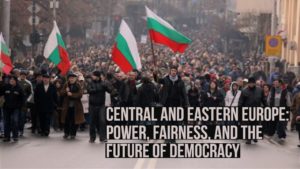 The divisive nature of Central Europe’s quasi-authoritarian governments precludes consensus-building, and has so weakened academic freedom and independent institutions that creative policy responses to economic challenges are being stifled. As a result, the only feedback mechanism in the region is demonstrations and civil disobedience, notes Piroska Nagy-Mohacsi, Program Director and Senior Fellow at the Institute of Global Affairs, London School of Economics. Central Europe is at an economic turning point, she writes for Project Syndicate:
The divisive nature of Central Europe’s quasi-authoritarian governments precludes consensus-building, and has so weakened academic freedom and independent institutions that creative policy responses to economic challenges are being stifled. As a result, the only feedback mechanism in the region is demonstrations and civil disobedience, notes Piroska Nagy-Mohacsi, Program Director and Senior Fellow at the Institute of Global Affairs, London School of Economics. Central Europe is at an economic turning point, she writes for Project Syndicate:
The old export-led convergence model based on access to the EU market and funding, supporting physical investment, productivity catch-up, and low labor costs, has served the region well, but it is exhausted. Central Europe needs a new innovation-based growth model based not on the price of labor, but rather on high-quality labor, which requires investment in education and lifelong training, as well as improved social policies. Budget spending must be prioritized accordingly and academic freedom, creativity, and dialogue – all increasingly in short supply – must be encouraged.
“But the region’s illiberal democracies will have a hard time managing this shift, because they deter free thinking and innovation, and they loath expertise-driven institutions,” Nagy-Mohacsi observes. RTWT
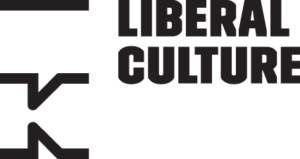 Poland’s civil society activists said that while they are focused on a wide range of different issues and operate in very different parts of the country, each with their own set of challenges, some challenges are common to all of them, the Guardian’s Christian Davies reports from Warsaw and Lubartów.:
Poland’s civil society activists said that while they are focused on a wide range of different issues and operate in very different parts of the country, each with their own set of challenges, some challenges are common to all of them, the Guardian’s Christian Davies reports from Warsaw and Lubartów.:
- The first is the difficulty in bridging the gap between citizens and officialdom – especially at the local level – in a society that remains in the shadow of communist authoritarianism even decades after the fall of communism itself….
- The second is the personal cost endured by many activists. Almost all of them said that their work has led them to come under pressure either from local authorities, employers, or their neighbours – sometimes even all three….
- The third is that although they see themselves as compensating for the existing weaknesses in Poland’s democratic culture and state institutions, some activists note that they will not be able to realise their aims at the national and local levels if the populists in government get there first. Their campaigns rely on independent courts to defend their rights, prosecute corruption, and enforce freedom of information requests – none of which will be possible if the judiciary is fully subjugated to Poland’s ruling party.
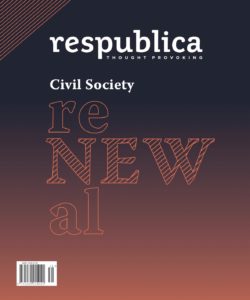 But recent political developments threaten the work of the region’s independent NGOs, including the withholding of public funds and interference with external funding mechanisms, according to Res Publica Nowa [HT: Eurozine, a partner of the National Endowment for Democracy]:
But recent political developments threaten the work of the region’s independent NGOs, including the withholding of public funds and interference with external funding mechanisms, according to Res Publica Nowa [HT: Eurozine, a partner of the National Endowment for Democracy]:
Financing: Only thirty organizations cash half of all income tax-based subsidies each year, while over eight thousand share the other half of the total. With illiberalism on the rise and public funds evaporating, cross-border financing and crowdfunding seem to be obvious choices for independent civic organizations. Yet crowdfunding requires capacities that most civic actors cannot afford….
- De-funding: ‘Bureaucracy, complicated formal requirements and continuous applications for funding have exacerbated the reluctance of many people, who have opted instead to invest their resources – time and money – and act socially in a smaller circle or local community’, states Collegium Civitas adjunct Katarzyna Iwińska. Around 50 per cent of civil society funding comes from the state, which is a problem in itself. Many organizations that perform crucial functions, such as watchdogs and women’s organizations, have already lost their funding, and have never had structures strong enough to be able to continue their activities.
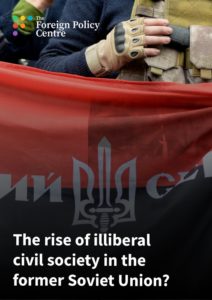 Political substitutes: When the public is disillusioned about politics and does not see its interests represented, NGOs tend to take up the baton, simply because somebody has to. Thus, ‘a lot of ideas and issues that are of a policy nature are only being heard from civil society; yet, crucially, these ideas are not reverberating or being echoed by political parties in governmental or administrative spheres’, says Pilnet director Andrej Nosko. This mechanism results in the ‘misperception that civil society organizations are in some way associated with or taking on the role of political parties or political actors’ – which in turn is used to discredit NGOs.
Political substitutes: When the public is disillusioned about politics and does not see its interests represented, NGOs tend to take up the baton, simply because somebody has to. Thus, ‘a lot of ideas and issues that are of a policy nature are only being heard from civil society; yet, crucially, these ideas are not reverberating or being echoed by political parties in governmental or administrative spheres’, says Pilnet director Andrej Nosko. This mechanism results in the ‘misperception that civil society organizations are in some way associated with or taking on the role of political parties or political actors’ – which in turn is used to discredit NGOs.
In Gdańsk, Pawel Adamowicz presided over numerous civic innovations before his brutal murder earlier this month. The rise of these movements is threatening to reshape the country’s politics, the Guardian adds:
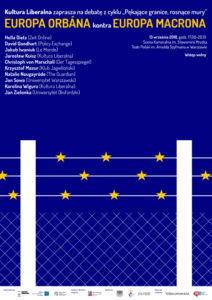 In urban areas, there has been a growth of so-called city movements, networks of campaigners challenging traditional political parties on questions of governance, corruption, planning and the environment. Some local authorities have responded to this growth in demand for accountability by introducing innovative new consultation mechanisms such as citizens’ panels, where groups of volunteers and randomly selected citizens participate in the city’s decision-making process, and participatory budgets, where citizens apply for financing for projects that they have drawn up themselves. In smaller towns across the country, long-entrenched local political leaders have found themselves under pressure or thrown out of office altogether by new candidates with no party-political affiliations.
In urban areas, there has been a growth of so-called city movements, networks of campaigners challenging traditional political parties on questions of governance, corruption, planning and the environment. Some local authorities have responded to this growth in demand for accountability by introducing innovative new consultation mechanisms such as citizens’ panels, where groups of volunteers and randomly selected citizens participate in the city’s decision-making process, and participatory budgets, where citizens apply for financing for projects that they have drawn up themselves. In smaller towns across the country, long-entrenched local political leaders have found themselves under pressure or thrown out of office altogether by new candidates with no party-political affiliations.
“Civil society is not about enlightened absolutism imposed from the top,” Adamowicz said at the time. “It takes place through the activism of different entrepreneurs and people of different professions and ideas, as well as through public disputes and conflicts. That is how civil society is created.”
“When you don’t know your rights, you would rather wait for orders from someone else, and assume that you can’t do something,” says Katarzyna Batko-Tołuć, director of Watchdog Polska, a Warsaw-based NGO. “People in Poland are free, but they don’t know they are free, they still don’t realise that they have the power to shape their own future. In my experience, once people start to know their rights, they start to be very self-confident.”







